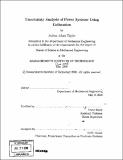Uncertainty analysis of power systems using collocation
Author(s)
Taylor, Joshua Adam
DownloadFull printable version (7.649Mb)
Other Contributors
Massachusetts Institute of Technology. Dept. of Mechanical Engineering.
Advisor
Franz Hover.
Terms of use
Metadata
Show full item recordAbstract
The next-generation all-electric ship represents a class of design and control problems in which the system is too large to approach analytically, and even with many conventional computational techniques. Additionally, numerous environmental interactions and inaccurate system model information make uncertainty a necessary consideration. Characterizing systems under uncertainty is essentially a problem of representing the system as a function over a random space. This can be accomplished by sampling the function, where in the case of the electric ship a "sample" is a simulation with uncertain parameters set according to the location of the sample. For systems on the scale of the electric ship, simulation is expensive, so we seek an accurate representation of the system from a minimal number of simulations. To this end, collocation is employed to compute statistical moments, from which sensitivity can be inferred, and to construct surrogate models with which interpolation can be used to propagate PDF's. These techniques are applied to three large-scale electric ship models. The conventional formulation for the sparse grid, a collocation algorithm, is modified to yield improved performance. Theoretical bounds and computational examples are given to support the modification. A dimension-adaptive collocation algorithm is implemented in an unscented Kalman filter, and improvement over extended Kalman and unscented filters is seen in two examples.
Description
Thesis (S.M.)--Massachusetts Institute of Technology, Dept. of Mechanical Engineering, 2008. Includes bibliographical references (p. 93-97).
Date issued
2008Department
Massachusetts Institute of Technology. Department of Mechanical EngineeringPublisher
Massachusetts Institute of Technology
Keywords
Mechanical Engineering.